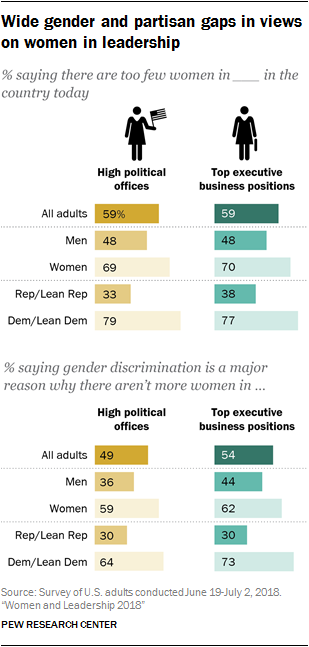
Two years after Hillary Clinton became the first woman to win the presidential nomination of a major U.S. political party, and with a record number of women running for Congress in 2018, a majority of Americans say they would like to see more women in top leadership positions – not only in politics, but also in the corporate world – according to a new Pew Research Center survey. But most say men still have an easier path to the top and that women have to do more to prove their worth. And the public is skeptical that the country will ever achieve gender parity in politics or in business.
Republicans and Democrats have widely different views about where things stand today and what factors are holding women back. Democrats and Democratic-leaning independents are more than twice as likely as Republicans and those who lean Republican to say there are too few women in high political offices (79% vs. 33%). And while 64% of Democrats say gender discrimination is a major reason why women are underrepresented in these positions, only 30% of Republicans agree.
There are also wide gender gaps in views about women in leadership. About seven-in-ten women say there are too few women in high political offices and in top executive business positions; about half of men say the same. And women are far more likely than men to see structural barriers and uneven expectations holding women back from these positions. About seven-in-ten women – vs. about half of men – say a major reason why women are underrepresented in top positions in politics and business is that they have to do more to prove themselves. And while about six-in-ten women say gender discrimination is a major obstacle to female leadership in each of these realms, smaller shares of men say this is the case in the corporate world (44%) or in politics (36%).
To a large degree, these gender gaps persist within parties. Among Republicans and Democrats, women are more likely than men to say there are too few women in political and corporate leadership positions, and there are substantial gender differences, particularly among Republicans, in views on the obstacles holding women back from these positions.
Despite the surge of female candidates this year, women are increasingly doubtful that voters are ready to elect more female leaders. A growing share cite this as a major reason why women are underrepresented in high political offices: 57% of women now say voters not being ready to elect women is a major reason, compared with 41% in 2014. Men remain much less likely to see this as a major impediment (32% of men do so).
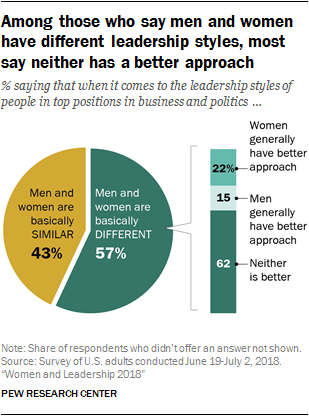
The survey also finds that Americans largely see men and women as equally capable when it comes to some key qualities and behaviors that are essential for leadership, even as a majority (57%) say men and women in top positions in business and politics tend to have different leadership styles. Among those who say men and women approach leadership differently, 62% say neither is better, while 22% say women generally have the better approach and 15% say men do.
Still, there are areas where the public sees female leaders as having an advantage. In both business and politics, majorities say women are better than men when it comes to being compassionate and empathetic, and substantial shares say women are better at working out compromises and standing up for what they believe in. Similarly, more adults say female political leaders do a better job of serving as role models for children (41%) and maintaining a tone of civility and respect (34%) than say the same about men. In each of these cases, only about one-in-ten or fewer give men the advantage. Male leaders are seen as better than their female counterparts when it comes to willingness to take risks; about four-in-ten say men in top executive positions and in high political offices are better than women in this regard.
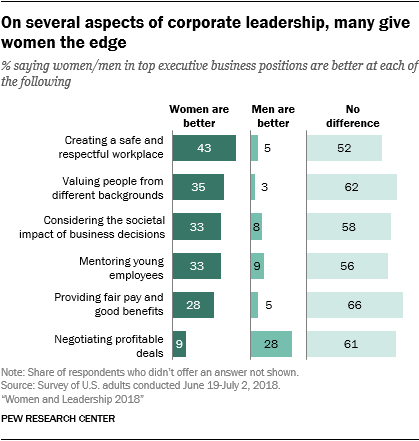
Looking specifically at corporate leadership, 43% say women are better at creating a safe and respectful workplace; 52% say there is no difference, while just 5% say men are better at this. And while majorities say there is no difference between male and female leaders when it comes to valuing people from different backgrounds, considering the impact of business decisions on society, providing guidance and mentorship to young employees, and providing fair pay and good benefits, those who do see a difference tend to give women the advantage.
Overall, the public sees benefits to female leadership. Majorities say having more women in top positions in business and government would improve the quality of life at least somewhat for all Americans (69%) and for women (77%) and men (57%) specifically. Women are far more likely than men to say having more women in top leadership positions would be beneficial. Two-thirds of women say having more female leaders would improve the quality of life for men at least somewhat, compared with 47% of men. And while majorities in both groups say this would improve the quality of life for all Americans, women are far more likely than men to say this is the case (78% vs. 59%).
The nationally representative survey of 4,587 adults was conducted online June 19-July 2, 2018, with support from Pivotal Ventures, using Pew Research Center’s American Trends Panel.1
Among the key findings:
Gender gaps on views of women in leadership are particularly wide among Republicans

By 20 percentage points, Republican women are more likely than their male counterparts to say there are too few women in high political offices (44% of GOP women vs. 24% of GOP men) and in top executive positions in business (49% vs. 29%) in the U.S. today. And while most Republican women say it’s easier for men to get these positions, closer to half of GOP men say the same.
Republican women are also far more likely than Republican men to point to uneven expectations and structural barriers as major reasons why women are underrepresented in political and corporate leadership. For example, a majority of Republican women (64%) – vs. 28% of GOP men – say women having to do more to prove themselves is a major reason why there are fewer women than men in high political offices. About half of Republican women point to many Americans not being ready to elect women (50% vs. 18% of GOP men), gender discrimination (48% vs. 14%) and women getting less support from party leaders (45% vs. 27%) as major reasons.
Among Democrats, majorities of women and men say there are too few women in political and business leadership positions, but this view is even more pronounced among women. And there are significant gaps in the shares of Democratic women and men who point to women not being encouraged to be leaders from an early age (63% of women vs. 42% of men) and to sexual harassment (56% vs. 41%) as major obstacles for women in politics.
Younger women less satisfied than older women with the number of female leaders and more likely to see gender discrimination as a major obstacle to reaching top positions

Majorities of women across age groups say there are too few women in high political offices and in top executive business positions and that it’s generally easier for men to get these positions, but these views are more prevalent among women younger than 50. About three-quarters of women ages 18 to 49 (74%) say there are too few women in top political offices, compared with 63% of women ages 50 and older. And while eight-in-ten women younger than 50 say it’s easier for men to get elected to high political offices, 68% of women in the older group say the same. The patterns are similar for business.
The age gap among women is also sizable when it comes to views about the role gender discrimination plays in the underrepresentation of women in politics. About seven-in-ten women ages 18 to 49 (68%) say gender discrimination is a major reason why there aren’t more women in high political offices, compared with 50% of older women.
Men’s views do not differ as much by age – younger men are no more likely than older men to say that there are too few women in top leadership positions in politics or business, that discrimination is holding women back, or that it’s easier for men to get top positions than it is for women.
About half of Americans want gender parity in political and business leadership; few want women to overtake men
A majority of Americans (59%) say there are too few women in top leadership positions in politics and in business today, with about half saying, ideally, there would be equal numbers of men and women. Much smaller shares say there should be more women than there are now but still not as many women as men or that women should outnumber men in these positions.
About a third of adults say the number of women in political and corporate leadership positions is about right, and fewer than one-in-ten say there are currently too many women in top leadership positions.
Women are more likely than men to say there should be equal numbers of men and women in top leadership positions. This is particularly true of Democratic women: 68% of Democratic women say that, ideally, there would be equal numbers of men and women in high political offices (and a similar share say the same about top corporate positions).
Still, many Americans are skeptical that women will ever be able to overcome the obstacles keeping them from achieving gender parity in business and political leadership. About half (48%) say men will continue to hold more high political offices in the future, even as more women run for office, and a similar share (46%) say men will continue to hold more top executive positions in business, even as more women move into management roles. Men are more likely than women to say the U.S. will eventually reach gender parity in top political and corporate leadership positions.
Majorities of men and women say that men have an easier path to leadership positions
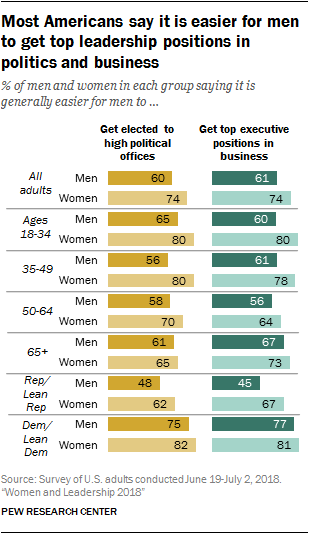
Two-thirds of Americans say it is generally easier for men to get elected to high political offices (67%); just 5% say it is easier for women, and 27% say there is not much difference. Views are nearly identical when it comes to top executive positions in business.
Majorities of both men and women say it is easier for men to get top leadership positions in politics and business, but this view is particularly prevalent among women. About three-quarters of women say it is easier for men to get elected to high political offices and to get top executive positions in business (74% each), compared with about six-in-ten men who say the same. Relatively few men or women say it is easier for women to get these positions.
Democrats are more likely than Republicans to say men have an easier time getting top leadership positions. Democratic men and women are fairly united in their views on this, whereas there is a sizable gender gap among Republicans. Two-thirds of Republican women say it’s easier for men to get top positions in business, compared with 45% of Republican men. Among Democrats, 77% of men and 81% of women hold this view. (The patterns are similar for political leadership.)
Most say women having to do more to prove themselves is a major barrier to female leadership

Americans see similar obstacles for women who are seeking top leadership positions in politics and in the corporate world. About six-in-ten say a major reason why women are underrepresented in high political offices and top executive positions in business is that women have to do more to prove themselves than men. About half say gender discrimination is a major barrier for women in each of these realms. Substantial shares also say that many businesses are not ready to hire women for top executive positions (47%) and that many Americans are not ready to elect women to higher offices (45%).
Perceptions of what contributes to the underrepresentation of women in political and business leadership positions vary widely across genders. At least seven-in-ten women, but closer to half of men, cite women having to do more to prove themselves as a major reason why there are fewer women than men in top business and political positions.
A majority of women also point to gender discrimination and voters not being ready to elect women as major barriers for women in politics. In contrast, roughly one-third of men see each of these as major reasons why there aren’t more women in higher office. In turn, men (31%) are more likely than women (23%) to say women simply aren’t as interested in holding top leadership positions in politics.
Majority of Americans say women and men have different leadership styles, but few think either gender has a better overall approach
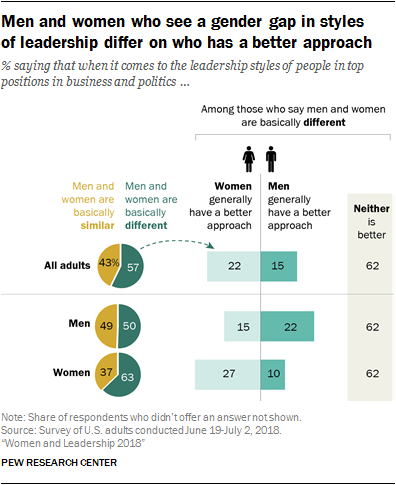
A majority of Americans (57%) think men and women in top positions in business and politics are basically different when it comes to their leadership styles; 43% say they are basically the same. Among those who see a difference between men and women in this regard, most (62%) don’t think either gender is better; 22% say women have a better approach and 15% say men do.
Again, views on this differ significantly by gender. Women are more likely than men to see a gender difference in leadership styles (63% vs. 50%). Among those who see a difference, about one-in-four women (27%) say that women have a better approach, while 10% say men are better. Men are more evenly divided on this: 22% say men have a better approach, 15% say women do.
Among Republicans, men and women have substantially different views on this issue. Roughly a third of Republican men (32%) who see a gender gap in leadership styles say men have the better approach, while only 6% say women have a better approach. Republican women are more evenly split: Among those who say men and women are basically different, 15% say women have a better approach and 18% say men do.
Many see men and women as equals on key leadership qualities, but those who see a difference tend to say that women are stronger in most areas
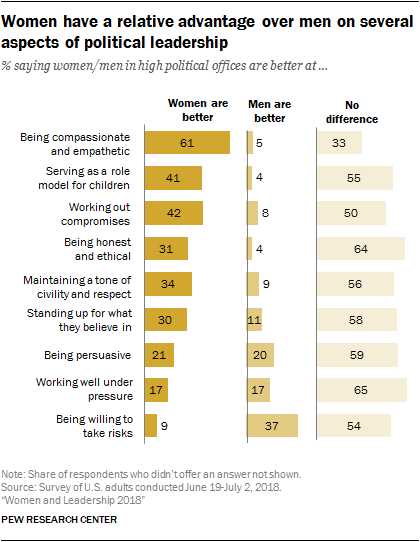
Majorities of Americans see little difference between men and women on a range of specific qualities and competencies that may be required for effective leadership. Among those who do see a difference, however, women are perceived to be stronger in most areas in both politics and business. Being compassionate and empathetic and being able to work out compromises are prominent examples of this. For their part, men are seen as having a relative advantage in being willing to take risks and negotiating profitable deals.
Among the traits Americans see as most essential to being a good business leader – creating a safe and respectful workplace and being honest and ethical – higher shares point to women as having the upper hand rather than men. Still, many say there is no difference between men and women in both cases.
Women are more likely than men to say female leaders outperform men on several leadership dimensions. For example, 71% of women say that women in political leadership are more compassionate and empathetic than men, while 50% of men say this is the case. Similarly, women are more likely than men to say that women in high political offices are better at maintaining a tone of civility and respect (41% vs 27%). For their part, men are more likely than women to say gender doesn’t make any difference for these and several other aspects of leadership.
When it comes to business, there are wide gender gaps on two items that relate directly to workplace culture. Women are significantly more likely than men to say that female business leaders are better than their male counterparts at creating a safe and respectful workplace and providing mentorship to young employees.
Most say women and men are equally capable of handling key policy areas and running companies across industries
Americans see only modest differences when asked about men’s and women’s abilities to run different types of companies. Still, many in the public associate some industries more with one gender than the other. Roughly three-in-ten adults (31%) say a woman would do a better job running a major retail chain. Only 6% say a man would do a better job at this. And the public is about twice as likely to say a woman would do a better job running a major hospital (19%) than to say the same about a man (8%). Men have a relative advantage when it comes to views of running a professional sports team – 45% say a man would do a better job at this, while 2% say a woman would be better.
The public doesn’t see either gender as having a significant advantage over the other in handling several key policy issues. On immigration, gun policy, the economy and the budget deficit, majorities of Americans say there’s no difference between male and female political leaders in their abilities. And among those who do see a difference between men and women in these areas, opinions are fairly evenly divided. There are two exceptions, however. By a margin of 42% to 4%, the public says women in politics do a better job handling social issues such as education and health care. The opposite pattern holds for dealing with national security and defense – 35% say men are better on these issues, while 6% point to women.
Americans have different ideas on what traits might be helpful (or harmful) to men and women seeking leadership positions
When asked whether certain personal traits or characteristics would mostly help or mostly hurt men and women seeking to succeed in business or in politics, about seven-in-ten adults say being assertive and ambitious would mostly help a man’s chances in both realms. Closer to half see these traits as helpful to women who are trying to get to the top. In fact, about a quarter say being assertive and ambitious mostly hurts a woman’s chances of getting ahead in politics and business.

An attribute that’s viewed as more helpful to women than to men is being physically attractive. Six-in-ten adults say this helps women get ahead in politics, and an even higher share say it helps women succeed in business. Fewer say being attractive is helpful to men.
Showing emotions is seen, on balance, as being more harmful than helpful to both men and women. Still, more say this hurts female leaders than male leaders. About half (52%) say showing emotions hurts women in politics, 39% say this about men. Smaller shares say this helps men (24%) and women (17%) in getting elected to higher office. The patterns are similar for business leaders.


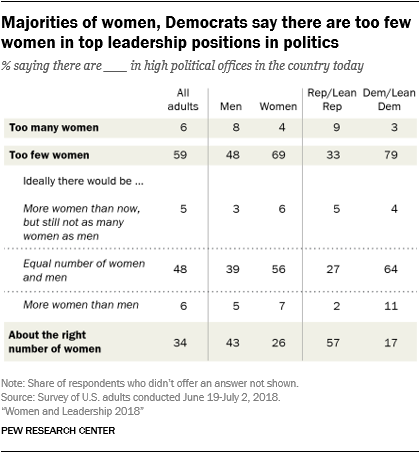
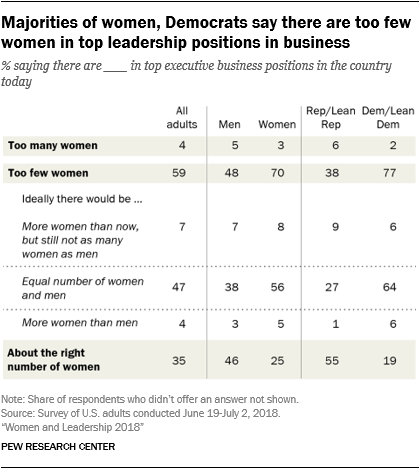
 Interactive: The data on women leaders
Interactive: The data on women leaders